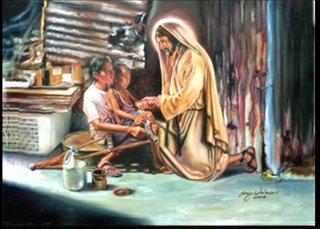All
true ministry has the goal of leading a people to faith in Jesus as Lord and
living that out in their lives.
n Identification—I Cor. 9:19-23 Some within a
congregation that will take on the role of an outcast in order to reach them. Get rid of the separation between the
“server” and the “served”.
n Offer to be Family—Mark 2:15-17; Luke 15. Total
love of the “sinner”, and an offer to partake in acceptance. This is the major felt need of the
outcast—social acceptability. To offer
acceptance is not to have the outcast feel that acceptance—this only comes with
an acceptance of forgiveness and inclusion in the community. This sense of family cannot be created by a
program, but one can use a program as a base-point to increase this acceptance.
n Listening—James 1:19 You cannot meet
anyone’s needs until you know what they are.
Get past the first hurdles in order to discover their real needs (e.g.
no one needs money, money is a means to meet the real need)
n Benevolence—Trying to meet their needs, but doing so with dependence on God. Those with resources, give what you have
(Luke 12:33); those without, pray for healing (Matt 10). To give what we have, may be to offer what
God alone has to give, instead of the petty resources we have (Acts 3:1-8).
n Deliverance—From Satan, from sin, from death.
This is God’s area, and if we are called to work with the outcast, we
are God’s representatives.
A. By prayer. (Mark 9:28-29; Luke 18:1-8). Through prayer,
deliverance from oppression can occur.
B. By teaching. (Matthew
28:19-20). Through the teaching of
Jesus’ commands, teaching and life there will come understanding of God’s
justice and of gaining that justice.
C. By dwelling with (John 1:14;
Acts 2:42-47). By living with the
outcast and showing them the life of Christ they will gain understanding and
the ability to live it out.
D. By suffering for. (John
12:24-27; Colossians 1:24) Through
suffering the suffering of Christ the people of God will be redeemed. This is the wake up call, the realization of
the atonement in the lives of the people, the life of Christ in the flesh.
n Forgiveness— Luke 15; Mark 2:1-12; John 20:23. This is also a sense of acceptance,
like mentioned above, under “family”.
But this is different, in that it occurs after regret for sin and
repentance is done. This is an
acceptance that comes after a wiping away of the debt of sin, and is fuller
than a simple offering of acceptance.
n Guiding to Commitment—Luke 14:26-27.
A. Commitment to God as the one
true Lord (Matthew 6:24);
B. Commitment to living
according to the righteousness of Jesus (Matthew 7:24-27; John 14:15);
C. Commitment to Love (Mark
21:29-31);
D. Commitment to the family of
God (Matthew 12:47-50);
E. Commitment to reaching out
to the outcast (Matthew 28:19-20).
Attitudes to Minister to the Outcast
Gentleness (Proverbs 15:1; Matthew
11:28-30; Galatians 6:1-2)
The outcast are typically wrathful, having been
oppressed by the evil. Even if they are
in sin, they don’t need to be treated with harshness. They know their sin, and if they do not, they
need to be informed carefully, not with anger.
They are looking for deliverance, they are looking for family. They will not choose to pursue family with those
who are harsh or critical. This is not
to say that sin should not be spoken of—it is.
But it needs to be dealt with kid gloves, not with wrath.
Patience (Psalm 103:8; I Thess. 2:9;
II Peter 3:9)
Convictions built up over years do
not melt away overnight. It requires
much patience and work to show others that God is for them, although the world
be against them. The outcast will reject
you, will speak evil of you, will mock you and secretly despise you. But over time, the message of the gospel will
work in the hearts—even of those who seems least likely to hear it! Labor patiently—literally for years—in order
to see the fruit of faith.
Impartiality
We
are not to show favoritism between social groups. (James 2:1-8; I Cor. 7:22) We
are not to show favoritism between ethnic or cultural groups. (Matthew 8:11-12;
Acts 10:34-35) We are not to show favoritism between knowledge of God. (Romans
2:11-13). We are not to show favoritism between sins. (James 2:10) This last is
a tricky one. We want to separate some
sinners from another because one sin is worse than another. James says that we are condemned by all of
them. If we are to offer a benefit or
service to one sinner outside of Christ, then why shouldn’t we give it to all
of them? Impartiality is essential in
ministry to the outcast, for their sense of injustice is strong.
Reliance on God (Matthew 10:9-10)
We, the ministers of the gospel,
must be dependent on God. In the New
Testament, most ministry is done with total dependence on God, for no one can
do miraculous healings or exorcisms of their own power. Even so, we must not depend on our own
resources or abilities to minister, but to rely on God and his work.
Surrender (Colossians 1:24; Philippians
2:3)
In ministering to the outcast, we
must be ready to sacrifice. The needs
are great—greater than we can meet. And
more will be demanded of us than we can give.
Yes, we do what we can so we can minister, but let us not set arbitrary
boundaries around our love. Instead, we
should set boundaries so we can love the most people we can. This will mean that care for ourselves might
be compromised—but this is what ministry is about. Do what you must to continue to love, and
beyond that, give and give.

No comments:
Post a Comment